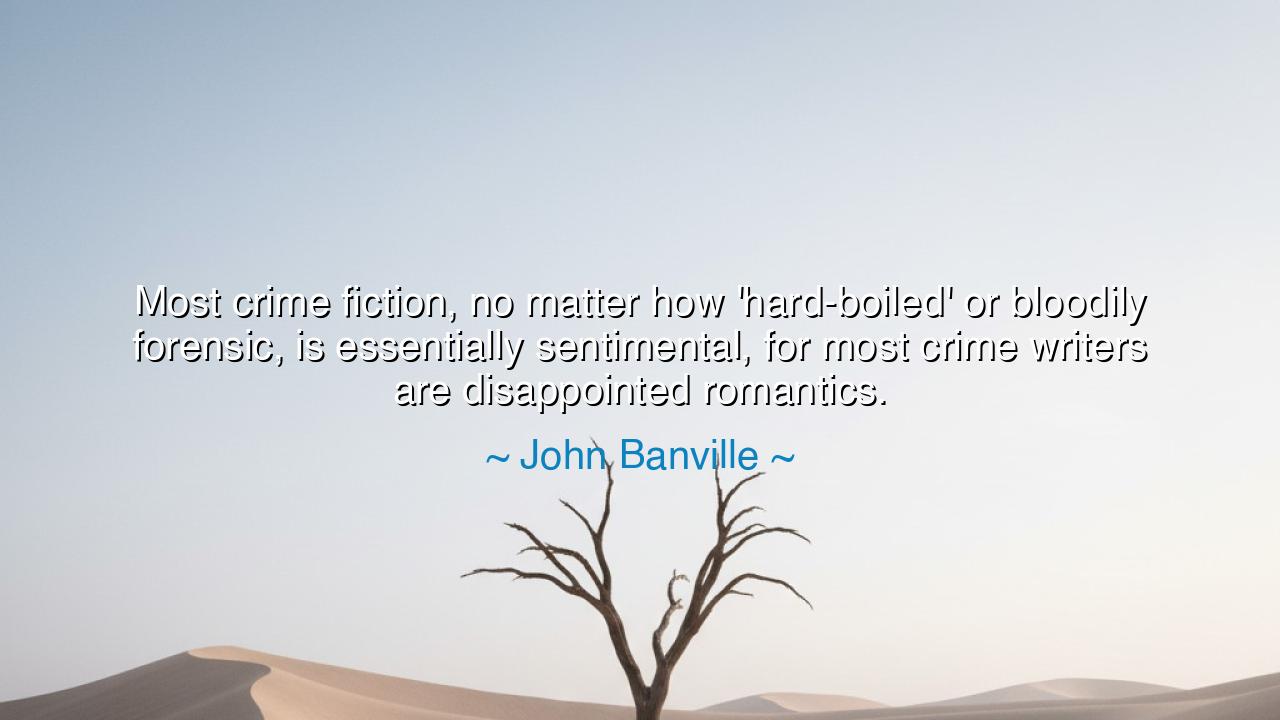
Most crime fiction, no matter how 'hard-boiled' or bloodily
Most crime fiction, no matter how 'hard-boiled' or bloodily forensic, is essentially sentimental, for most crime writers are disappointed romantics.






In the profound words of John Banville, "Most crime fiction, no matter how 'hard-boiled' or bloodily forensic, is essentially sentimental, for most crime writers are disappointed romantics," we are invited to delve into the heart of storytelling and human emotion. At first glance, crime fiction—especially its gritty, hard-edged forms like the noir and forensic thrillers—seems far removed from romanticism. It often deals with the seedy underbelly of society, uncovering hidden corruption, betrayal, and violence. Yet Banville points out a deeper truth: the core of these stories is often sentimentality, a longing for something lost, a disappointment with the world, and a search for redemption—themes not unlike the romantic ideals that once defined poets and dreamers of ages past.
To understand this, one must look to the ancient concept of romance. The romantic ideal is not simply about love, but about the pursuit of beauty, truth, and justice—values that were often at odds with the harsh realities of the world. The ancient Greek tragedies, for instance, were filled with noble characters whose lofty ideals collided violently with the unforgiving forces of fate and human nature. Oedipus, despite his wisdom and noble birth, could not escape his tragic fate, his life a series of romantic aspirations doomed to be crushed by the cold hand of destiny. In much the same way, Banville suggests, crime fiction—with its dark plots and relentless violence—often reflects this same romantic disillusionment. The protagonists are often driven by a sense of idealism or justice, yet the world they inhabit does not easily yield to their noble pursuits.
Consider the ancient Romans, who celebrated not only military conquest but also the eternal struggle between virtue and corruption. Their heroes, like Cicero or Brutus, were often torn between personal desires and the greater good. Yet, these struggles were not without loss. Brutus, though he believed in the nobility of assassinating Julius Caesar for the sake of the Republic, ultimately faced the tragic consequences of his actions. This internal conflict—the tension between idealism and the harsh truths of the world—is what drives much of crime fiction, where characters like Philip Marlowe or Sam Spade navigate a world of moral ambiguity, seeking justice and truth in a society that seems bent on corruption and betrayal. In this sense, they are disappointed romantics, driven by ideals that are often unattainable or doomed.
The notion that crime writers are disappointed romantics speaks not only to the genre but to the essence of human nature. Crime fiction, despite its blood-soaked pages, often reflects the longing for a better world, a world where justice can be served and moral clarity can be found. Yet, the world these writers create is fractured, filled with gray areas, where heroes often fail, and villains are more complex than their actions suggest. In this way, crime fiction mirrors the ancient epic tales of Homer, where Achilles and Odysseus are noble men, but also men who are flawed, haunted by their desires and choices. Achilles, for instance, sought honor and glory, but it was his pride and rage that ultimately led him to tragic ends. Similarly, crime writers are drawn to the struggles of their characters, knowing that no matter how hard-boiled the story may be, there is always an undercurrent of hope or disillusionment that drives the narrative forward.
This view of crime fiction as sentimental and born of romantic disappointment invites us to see the genre not as a simple exploration of crime, but as a reflection of the human soul, ever yearning for meaning and redemption in a chaotic and indifferent world. Whether it is the hard-boiled detective or the forensic expert, these characters are often seeking not just to solve a crime but to make sense of a world that seems increasingly disjointed and unjust. The sentimentality comes not in the violence or the gritty realism, but in the constant longing for something better, for a resolution that never quite arrives, much like the ancient heroes whose journeys were filled with both greatness and sorrow.
The lesson here, then, is one of recognition. The romantic spirit is alive in all forms of storytelling, even in the darkest corners of crime fiction. Whether through the longing for justice, the search for meaning, or the struggle to reconcile idealism with the harsh realities of life, crime writers channel the same disappointments that have shaped philosophers, poets, and artists throughout history. The ideal is always present, whether overt or subtle, in the way characters seek truth in a world that resists clarity. Just as the ancients used myth to express the inner conflict of their heroes, so too do crime writers use their narratives to explore the eternal struggle between hope and disillusionment.
In your own life, recognize that disappointment and longing are not weaknesses, but reflections of your deeper search for meaning. Embrace the fact that in the pursuit of your ideals—whether in love, work, or personal growth—you may encounter failure and frustration, but these are the very struggles that shape your character. Like the ancient heroes and the crime writers who came before you, the key is to never stop searching for truth, even in a world that seems determined to obscure it. Romanticism, in its deepest sense, is not about blind idealism but the courage to continue the quest, no matter how difficult the path may seem.






AAdministratorAdministrator
Welcome, honored guests. Please leave a comment, we will respond soon